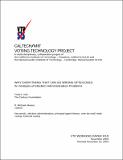| dc.contributor.author | Hall, Thad E. | |
| dc.contributor.author | Alvarez, R. Michael | |
| dc.date.accessioned | 2015-04-14T16:59:25Z | |
| dc.date.available | 2015-04-14T16:59:25Z | |
| dc.date.issued | 2003-11-26 | |
| dc.identifier.uri | http://hdl.handle.net/1721.1/96547 | |
| dc.description.abstract | Before the 2000 presidential election, few citizens in the United States paid much attention to election administration. But scholars have noted that election administration has been a problem for decades. Despite the attention paid to election administration in the research literature, most public policy efforts in since 2000 have been focused on purchasing new voting equipment and fixing problematic procedures, and not on resolving some of the underlying problems in the process of conducting elections in America. Our paper applies the logic of principal-agent theory to the problem of election administration, and analyzes problems in the conduct of elections from this perspective. We examine various components of the dominant method of voting in the United States—poll site voting—and use our principal-agent perspective to demonstrate that serious problems in the polling place environment could be resolved by other means of serving voters, especially vote-by-mail, early voting, and Internet voting. | en_US |
| dc.language.iso | en_US | en_US |
| dc.publisher | Caltech/MIT Voting Technology Project | en_US |
| dc.relation.ispartofseries | VTP Working Paper Series;10 | |
| dc.subject | Election administration | en_US |
| dc.subject | Principal-agent theory | en_US |
| dc.subject | Vote-by-mail | en_US |
| dc.subject | Early voting | en_US |
| dc.subject | Internet voting | en_US |
| dc.title | Why Everything That Can Go Wrong Often Does: An Analysis of Election Administration Problems | en_US |
| dc.type | Working Paper | en_US |
